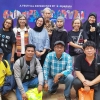Emerging interventions also explore the use of technology, such as assistive reading software and apps that provide visual and auditory support for struggling readers, helping them bridge the gap between phonological and orthographic processing.
8. Cross-Linguistic Perspectives on Dyslexia
One fascinating area of psycholinguistics is the study of dyslexia across different languages. Languages with more regular or "transparent" orthographies (like Italian or Spanish, where letters consistently map onto sounds) tend to produce fewer severe dyslexia cases than languages with more complex orthographies, like English.
For example, Italian-speaking children with dyslexia may struggle less with decoding because the relationship between letters and sounds is more straightforward, while English-speaking children face greater challenges due to the irregular spelling rules in English. This cross-linguistic research helps psycholinguists understand how the specific characteristics of a language influence the manifestation of dyslexia and guides educators in creating language-specific interventions.
Conclusion
Psycholinguistics offers valuable insights into the nature of dyslexia by investigating how language is processed at cognitive and neurological levels. The phonological deficits, orthographic challenges, and working memory limitations that characterize dyslexia all point to the complex interaction of different cognitive systems required for fluent reading. Understanding these difficulties enables researchers and educators to design more effective interventions and support systems for individuals with dyslexia, helping them overcome the barriers to reading and spelling.
While dyslexia presents significant challenges, ongoing psycholinguistic research continues to expand our understanding of this disorder, paving the way for more nuanced, tailored approaches to learning and literacy development.
Baca konten-konten menarik Kompasiana langsung dari smartphone kamu. Follow channel WhatsApp Kompasiana sekarang di sini: https://whatsapp.com/channel/0029VaYjYaL4Spk7WflFYJ2H







